- Home
- Chris Wooding
Ketty Jay 04 - The Ace of Skulls Page 23
Ketty Jay 04 - The Ace of Skulls Read online
Page 23
‘As the Code dictates,’ some of the assembled muttered.
Frey exchanged a glance with Malvery. Normally he rolled his eyes at the pompous overblown language that boring people used to sound important, but this talk of hammer blows and triumphant assaults worried him. It sounded like the Awakeners were planning something big, and soon.
‘The Lord High Cryptographer may rest assured,’ said the Interpreter, ‘the device will work as our Samarlan allies have promised. Our enemies’ weapons will jam, their lights will fail, and they will fall from the skies.’
Frey felt his heart turn to ice. He knew exactly what the Azryx machine did now. He’d experienced its power in the Samarlan desert, when an identical device had disabled the Ketty Jay and brought her crashing down. That one was destroyed when the Azryx city was obliterated, but there must have been others. The Samarlans had got hold of one, and they’d sold it to the Awakeners.
He saw in his mind’s eye what would happen if that device was activated in the middle of a fleet. Frigates, fighters, gunships, spiralling out of control or diving unstoppably earthward as their aerium tanks vented. Those that didn’t crash would just hang in the air, sitting ducks for the enemy guns.
Hundreds of aircraft. Thousands of lives. Rot and damnation, it would be a massacre.
He’d been content to drift through the civil war and let it work itself out without much help from him, safe in the knowledge that the Coalition could handle itself. But matters had become a whole lot more urgent all of a sudden. He’d never really thought the Awakeners might actually win.
‘The Lord High Cryptographer wishes to look up on the device with his own eyes,’ the hooded lady announced. ‘You will leave the room.’
Her peremptory demand was met at first with confusion and hesitation. Then the Interpreter clapped, and everyone outside the Lord High Cryptographer’s immediate retinue bowed and left the room. The door slid closed behind them. Only the aide and his personal guard remained.
Frey and Malvery hunkered down deeper into cover and watched as the hooded lady removed the visor from the Lord High Cryptographer’s eyes. Frey was disconcerted to see that the mask covered his face entirely, even the parts that were hidden by the visor. His mouth and eye sockets were mere depressions in the fabric; there was barely any nose at all. He was a blank, a ghostly mannequin.
The aide carefully slid her fingers under the neck of the mask, rolled it up and slipped it off.
The Lord High Cryptographer was ancient. His scrawny, wattled neck extended like a vulture’s as he leaned forward, gazing upon the Azryx device with an expression of idiot greed. His eyes were a starburst of red and yellow, irises like a spatter of blood and pus. His bald head was liver-spotted; his nose had all but rotted away. And when his puckered mouth opened in a sigh of wonder, they saw his teeth. Teeth like needles, long and thin and sharp.
Unmasked, Frey adored him, and the feeling filled him with horror. He’d never imagined it was possible for two such polarised emotions to exist together. His mind and his body were repulsed, but his heart swelled with something atrociously close to love. He wanted to believe. Had he not been so set against the Awakener’s dogma, he might have turned to the faith right then. There had to be something in it, surely? All those people couldn’t be wrong? How else to explain the sense of righteousness that emanated from this man, this great man, this
daemon
He said the word to himself and it put steel in his spine. He’d seen the face of an Imperator and he’d seen Manes, and he knew they were not so different. He’d seen the way a daemon changed its host. And in the Lord High Cryptographer’s face, he saw the same.
Once he’d been a man, but not any more. Like the Imperators, he had a daemon inside him. Perhaps he’d put it there himself, to acquire the powers it bestowed. Perhaps he believed his faith would overcome it. Or perhaps, more dreadfully, his own Imperators had forced him to it, turned on their master and made him one of them.
He didn’t know. He couldn’t guess. But he knew one thing. The Awakeners had used daemonism to create enforcers that allowed them to destroy the old religions. But somehow, over the years, it had got out of control. And the daemons were in charge now.
If the Coalition lost the civil war, Vardia wouldn’t be ruled by fanatics. It would be ruled by daemons. He gazed upon the face of the Lord High Cryptographer, and he saw the future, and it was unutterably terrible.
The creature crooned as it looked upon the Azryx device. It saw victory and lusted for it. It was a sound of such lascivious want that Frey had the urge to seize his revolver and shoot the damned thing right there.
But to shoot it would be suicide, and he couldn’t have done it anyway. The Imperators emanated fear, but this daemon was worse. It emanated love.
He saw Malvery struggling with the same feelings. His face was locked in a taut frown and he was breathing heavily. He wondered if Malvery might really pull out his shotgun and end it now, destroy the monster and the machine, whatever the consequences. It was the kind of stupid heroism patriots were prone to.
But Malvery didn’t fire, and the daemon’s face was covered once more. When they were ready, the aide opened the door to the chamber once again. The others were waiting outside. Words were exchanged outside their hearing, and the Lord High Cryptographer and his retinue left, accompanied by the Interpreter. The scientists stood in the doorway with the Sentinels after they were gone, talking amongst themselves.
‘We have to do something,’ said Malvery.
‘We have to get out of here,’ Frey replied, pointing to the ladder that led up to the observation room. At the moment the Awakeners were not watching the room, but if they came in, there was no way Frey and Malvery would make it to that ladder without getting spotted.
Malvery was reluctant, his mouth set in a grim line. It didn’t sit well with him, leaving something like that in the hands of the Awakeners.
‘Doc!’ said Frey sharply. ‘Who’s gonna tell the Coalition if we’re dead?’
Malvery gave an exasperated sigh. Frey had got through to him with that. ‘Come on,’ he said.
They slipped between the banks of machinery, keeping their eyes on the scientists and Sentinels, who were deep in discussion just outside the chamber door.
Keep talking, Frey thought. He looked up at the window of the observation room, and saw that Ashua was practically jumping up and down, beckoning them.
Stealthily he ran the last few metres to the ladder and went scampering up the rungs. Malvery came more slowly behind him, blowing out his moustaches with the effort. Frey’s muscles were tight with tension as he climbed higher. Surely someone would turn and see him? Surely he was so obvious that they couldn’t fail to notice?
But he gained the top of the ladder and no alarm was raised. Ashua all but hauled him through the hatch and into the room, then went back to urge Malvery on.
Frey picked himself up and checked on everybody. Pinn was staring out of the window with a puzzled look on his face. He looked even more vacant than usual. Jez was in a corner, crouched, her teeth bared. Pelaru squatted before her, hand raised, like a man calming a skittish dog. He looked over his shoulder at Frey.
‘The Lord High Cryptographer,’ said Pelaru, and for once there was visible emotion on his face. ‘He’s—’
‘A daemon,’ said Frey. ‘I got that.’
‘She doesn’t take it well when there are daemons about.’
‘I got that too.’
Malvery clambered through the hatch, and sat down on the floor against a workbench to catch his breath. Frey went to the window and looked down into the chamber. The Awakeners were still in the doorway; they hadn’t even come in yet.
‘What did they say?’ Ashua asked Malvery.
Malvery stared at her with a look of such despair that even Frey was affected. It took a lot to knock Malvery down, but this had rocked him.
‘Give me the earcuff,’ he said to Ashua. She dug it from her pocket and lobbed it
to him.
‘We have to get gone, Cap’n,’ Malvery said. ‘We have to tell someone.’
‘We’re going, Doc,’ said Frey, clipping on the earcuff. ‘Just let me check on Trinica . . .’
His voice tailed off as the sounds filled his ear. They were fuzzy and indistinct, but the words didn’t concern him. It was the tone. Shouting. Protests. Alarm. He heard an impact and a crash. Trinica cried out, and it stabbed through the confusion and pierced him.
They saw it on his face. ‘Cap’n . . .’ said Malvery, a warning in his voice.
‘She’s in trouble,’ he said. He looked about wildly. ‘She’s in trouble!’
‘Cap’n, we have to go!’ Malvery insisted.
‘You go,’ said Frey. ‘Get out of here. I’m going after her.’
‘This is too important!’ said Malvery.
‘Yeah,’ said Frey. ‘It is.’ And with that he pulled open the door and headed off down the corridor.
Malvery swore. Ashua looked from the doctor to the departing captain in confusion.
‘Are we just gonna let him go on his own?’ she asked.
‘Y’know, I hope he rescues her, I really do,’ Malvery snarled as he got to his feet. ‘That way I can punt her pasty arse to the moon.’
He stormed out of the door in pursuit of his captain, and the others had no choice but to follow.
Twenty
The Groundsman – Family Ties – Accusations – Up on the Roof – A Long-Expected Admission
Crake pushed open the door of his brother’s house, and looked out onto a battleground.
Guns cracked and snapped in the cold winter night. Trench-coated Shacklemores fired lever-action shotguns from cover, their breath steaming the air. Men were clambering over the wall that surrounded the grounds, their shadows long in the light of electric lamps. Folk from the village, from the countryside; folk who’d once been glad of the wealth and prosperity that Rogibald Crake had helped bring to the area, the amenities he paid for and the school he funded.
Crake felt outrage as well as fear. They were attacking the manor? They were actually attacking the manor? But he couldn’t deny the evidence of his eyes.
The main mass of them had gathered behind the gates. He could hear the incoherent roar of their fury. Shacklemores shot at them from behind fountains and garden walls. Crake saw one man go tumbling back into the arms of his fellows, but those behind him pushed on, undeterred. The gate was stout and thick, and wouldn’t give way easily. Several men were wrapping a chain around the ironwork, no doubt hoping to drag it down. Others fired back through the bars, keeping the Shacklemores busy.
There were so many of them. So many, and more coming over the wall. Some were killed, but Crake saw others drop to the ground and go scurrying away across the night-shrouded lawns, rough-dressed men carrying clubs or pistols.
Condred was at his side, leaning on him, supported by his arm. He heard his brother groan, a sound of weary despair from the depths of his being. In the flat light from the house he was haggard and wan. He was barefoot, and his red silk gown was no protection against the chill. In his face there was something like acceptance, as if he’d long known this day would come.
‘They’re here for you, ain’t they?’ a voice snarled. Crake turned and saw one of the groundsmen, a man he didn’t know, advancing along the side of the house. He was a stocky, unshaven man with a cloth cap squashed down over his ears. He had a spade in his hands, and was holding it like a weapon.
‘Daemonist!’ he spat. Then he looked at Condred. ‘And you, his puppet! What black art brought you back when no doctors could? Whatever you once was, you ain’t no more.’
Crake saw fear and rage and murder in the man’s eyes, and he backed away into the foyer, pulling Condred in with him. But the groundsman lunged at him suddenly, made a feint with the spade. Crake jerked away, stumbled, and Condred’s weight brought him down. The two of them tripped and fell to the parquet floor in a heap.
The groundsman ignored Condred and went for Crake. He put his boot to Crake’s shoulder as he tried to get up, and shoved him back to the floor. He raised his spade, edge downward, aimed at Crake’s throat. Hesitated. Not so easy to kill a man. But Crake knew it was coming in a second or two, once he’d screwed up his courage.
A strange calm took him. He looked up at the grizzled face of the groundsman looming over him. His lips peeled back in a wide grin.
‘Hey . . .’ he said quietly, though it hurt to speak with the man’s weight on his chest. ‘Hey, there’s no need for this.’
The groundsman stared down at him, and as he did so, his attention was caught by something. The glitter of a gold tooth. Crake saw the balled-up rage behind the groundsman’s eyes loosen a little.
‘Here . . .’ he muttered. ‘That’s a nice tooth.’
‘It is, isn’t it?’ said Crake. ‘Now why don’t you get off me and put down that spade?’
The groundsman regarded the spade as if he couldn’t quite work out how it had got into his hands. ‘Reckon I will,’ he said. He stepped back, tossed the spade aside, and gave Crake a sheepish look.
Crake began to pick himself up. ‘Good. Now why don’t you—’
The groundsman’s chest exploded, spraying Crake’s face with warm flecks of blood. He fell to his knees and tipped sideways. Standing in the doorway was a Shacklemore, a gaunt man holding a shotgun, a scattered beard on his long, hollow face.
‘You alright?’ he asked them, and pulled Crake up before he had a chance to reply. He went and helped Condred after. Crake wiped the blood off his face and looked down at the dead man on the floor. There was a wet hole in his back. A pool of red was spreading from beneath the body, running down tiny channels in the parquet floor.
Another dead man. Once the initial shock had worn off, he found it didn’t mean a thing. He’d lived long enough in the world to shrug at a stranger’s corpse.
‘Let’s get you to the landing pad,’ said the Shacklemore brusquely. ‘We’re falling back.’
‘I thought you were supposed to defend this place,’ Crake said.
‘There’s two hundred people out there, or I’m a blind man,’ said the Shacklemore. He took Condred’s arm over his shoulder. ‘We’re bounty hunters first, bodyguards second and mercenaries third. Martyrs ain’t on the list.’
‘What about our father? Rogibald Crake?’
‘The old feller? Someone’s taking care of him.’
But the man was vague, and Crake wasn’t convinced. And he knew his father.
‘Take my brother to the landing pad,’ he said.
The lines around Condred’s mouth deepened in disapproval. ‘Leave him, Grayther. You know him. He’ll do as we will.’
Yes, thought Crake. I know him well enough.
But Condred saw his brother’s mind, and grabbed his arm. ‘You don’t have to make it up to him,’ he said. ‘Not to him.’
‘Go to Thesk,’ said Crake. ‘Perhaps I’ll see you there.’
Perhaps. And perhaps I’ll never see you again. Perhaps we’ll never again be able to look at each other without being reminded of Bess.
Crake looked long into his brother’s eyes, searching for something to say. Condred was thinking the same as he was. Neither knew what the future would bring. It was all too raw and new right now. In the end, he clasped his hand over Condred’s, and that was enough.
‘Get him out of here,’ he told the Shacklemore. ‘Keep him safe.’
‘Will do.’
Crake turned to leave, and then stopped and turned back. ‘One last thing,’ he said. ‘You’ve a pistol in your belt. I’d better have that.’
‘Will you bollocks,’ scoffed the Shacklemore. ‘That’s my pistol.’
Crake grinned, and his tooth glinted. ‘I beg to differ.’
By the time he reached the mansion, the Shacklemores were in steady retreat. Groups of men shot at one another from cover. Bodies lay sprawled across herbaceous borders, bloodied hands dangling in ornamental pools. Th
e fighting was still fiercest round the gates, but enough men had got over the walls to sow havoc among the defenders now.
I did this, he thought as he ran. They’re here for me. Seeing me take Condred to the sanctum was the last straw.
But no. He wouldn’t blame himself entirely. The Awakeners had riled them up, filled their heads with lies and nonsense, made them furious and frightened so the only thing they could do was hit out. Even the Shacklemore bullets didn’t stop them. All these deaths born out of hate and ignorance and superstition, and the bastards who started it were predictably nowhere to be seen.
He ran up the slope towards his father’s house, keeping to the edge of the lawns where there was some meagre cover, staying out of the light. A bullet chopped into the turf nearby and he saw someone aiming at him from over by the wall. He ignored them and kept going. After all his time on the Ketty Jay, he knew they were just wasting ammunition at that range.
What are you doing, Grayther Crake? What do you owe your father? The man never loved you.
But love didn’t matter. It was a question of duty. It was what a son ought to do. And maybe if Rogibald found out what Crake had done, maybe if he knew Condred was alright, maybe he’d smile and favour him at last.
Foolish, he thought. But he ran on anyway.
Crake reached the mansion and went skirting along its fac¸ade, sticking close to the building. As he reached the main door, a Shacklemore came running out of it onto the drive, a young man with slick black hair. He looked about, saw Crake, and then raised his pistol and fired twice. Crake covered his face instinctively as a stone vase smashed to pieces next to him.
‘Stop firing, you moron! Do I look like a bloody peasant? I’m on your side!’
He didn’t know where that peremptory tone of command came from. Perhaps his surroundings had brought out his aristocratic side. But the Shacklemore stopped shooting.

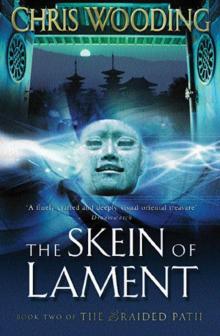 The Skein of Lament
The Skein of Lament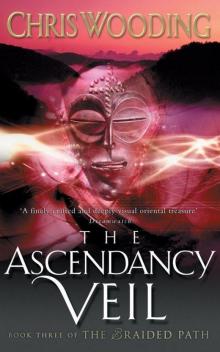 Braided Path 03 - The Ascendancy Veil
Braided Path 03 - The Ascendancy Veil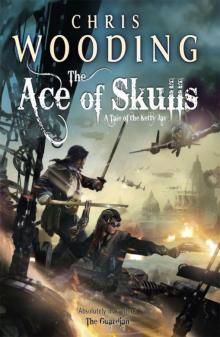 The Ace of Skulls
The Ace of Skulls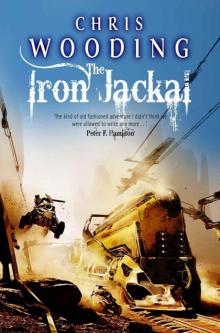 The Iron Jackal
The Iron Jackal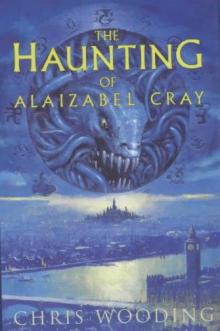 The Haunting of Alaizabel Cray
The Haunting of Alaizabel Cray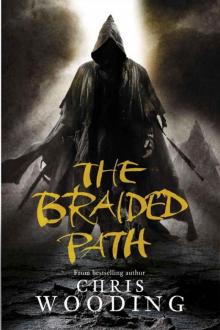 The Braided Path: The Weavers of Saramyr / the Skein of Lament / the Ascendancy Veil
The Braided Path: The Weavers of Saramyr / the Skein of Lament / the Ascendancy Veil Storm Thief
Storm Thief Silver
Silver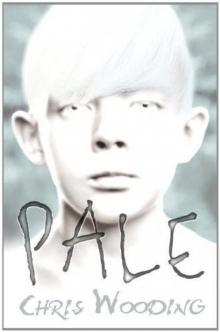 Pale
Pale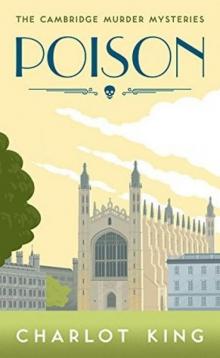 Poison
Poison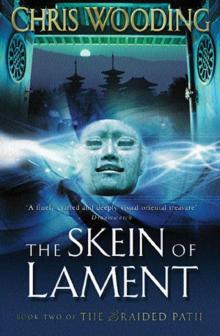 Braided Path 02 - The Skein Of Lament
Braided Path 02 - The Skein Of Lament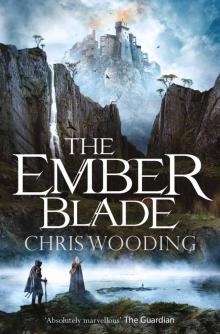 The Ember Blade
The Ember Blade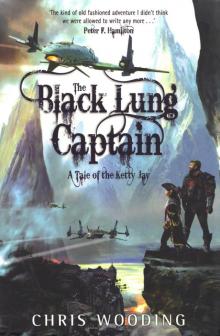 The Black Lung Captain
The Black Lung Captain Out of This World
Out of This World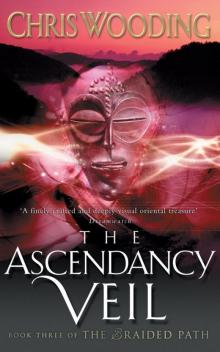 The Braided Path: Ascendancy Veil Bk. 3
The Braided Path: Ascendancy Veil Bk. 3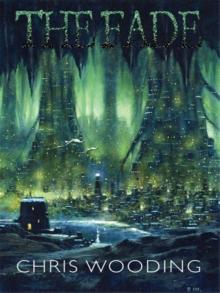 The Fade kj-2
The Fade kj-2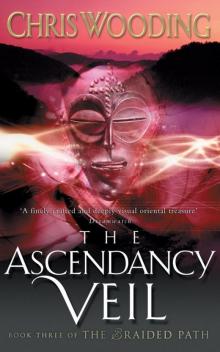 The Ascendancy Veil: Book Three of the Braided Path
The Ascendancy Veil: Book Three of the Braided Path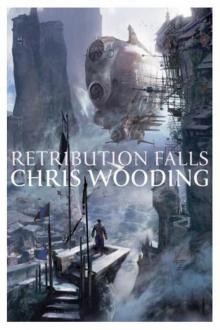 Retribution Falls totkj-1
Retribution Falls totkj-1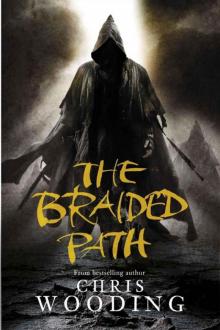 The Braided Path: The Weavers of Saramyr, The Skein of Lament and the Ascendancy Veil
The Braided Path: The Weavers of Saramyr, The Skein of Lament and the Ascendancy Veil Ketty Jay 04 - The Ace of Skulls
Ketty Jay 04 - The Ace of Skulls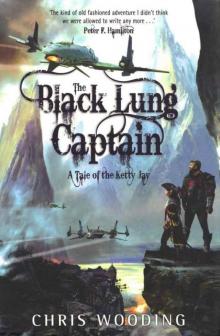 The Black Lung Captain totkj-2
The Black Lung Captain totkj-2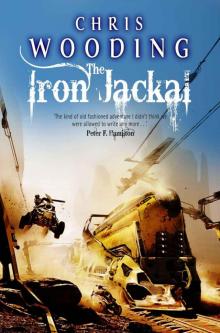 The Iron jackal totkj-3
The Iron jackal totkj-3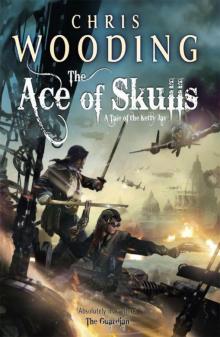 The Ace of Skulls totkj-4
The Ace of Skulls totkj-4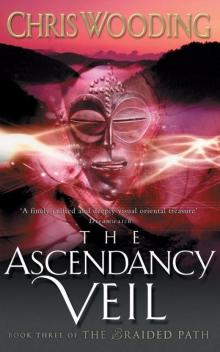 The ascendancy veil bp-3
The ascendancy veil bp-3